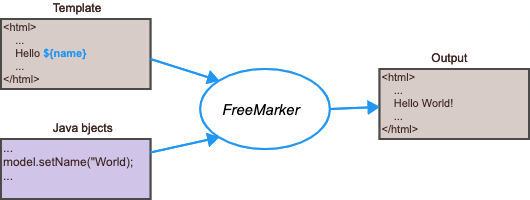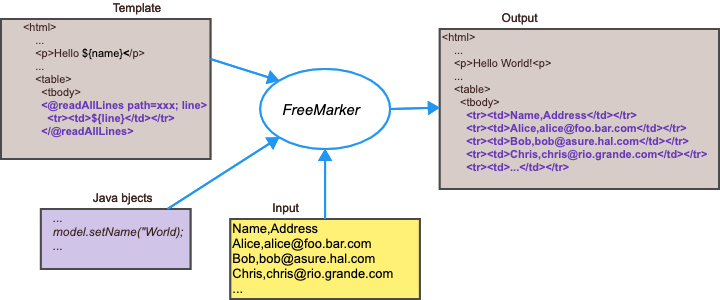kazurayam_FreeMarker_directives
FreeMarker Directives defined by kazurayam
This project is a collection of FreeMarker user-defined directives developed by kazurayam.
It was tested with FreeMarker v2.3.31.
readAllLines
The readAllLines directive reads a text file specified by the path parameter,
iterate over all lines in it, generate the templated body.
It will provide a loopVariable that contains the line.
Synopsis
<@readAllLines path="path to the file" ; line>
<p>${line}</p>
</@readAllLines>
Motivation
Let me consider a case where I am going to generate a HTML file using FreeMarker; I have a simple text file with some number of lines, and I want to insert HTML fragment as follows:
<tr><td> ... line #1 ... </td></tr>
<tr><td> ... line #2 ... </td></tr>
<tr><td> ... line #3 ... </td></tr>
...
You may be or may not be aware, FreeMarker does not provide a built-in directive with which I can read a text content from external file, and transform the lines into HTML fragments. The following diagram shows the basic how FreeMarker works.

Now I wanted to do something like this:

My custom readAllLines directive just enambles me to do it.
Sample usage
Caller Java
ReadAllLinesDirectivesTest.java
package com.kazurayam.freemarker;
import freemarker.template.Template;
import freemarker.template.TemplateException;
import org.junit.jupiter.api.Test;
import java.io.IOException;
import java.io.StringWriter;
import java.io.Writer;
import static org.junit.jupiter.api.Assertions.assertNotNull;
import static org.junit.jupiter.api.Assertions.assertTrue;
public class ReadAllLinesDirectiveTest extends TestBase {
public ReadAllLinesDirectiveTest() throws IOException {
super();
}
@Test
public void test_execute() throws IOException, TemplateException {
/* Get the template (uses cache internally) */
Template temp = cfg.getTemplate("readAllLinesDemo.ftlh");
/* Merge data-model with template */
Writer out = new StringWriter();
temp.process(model, out);
String output = out.toString();
assertNotNull(output);
assertTrue(output.contains("<tr><td>0</td><td>publishedDate,uri,title,link,description,author</td></tr>"));
System.out.println(output);
}
}
TestBase.java
The test classes here extends TestBase.java which prepares
the configuration of FreeMarker.
Please note that some sharedVariables are declared here,
which includes the name of directives (e.g, readAllLines).
TestBase
package com.kazurayam.freemarker;
import freemarker.template.Configuration;
import freemarker.template.TemplateExceptionHandler;
import freemarker.template.TemplateModelException;
import java.io.IOException;
import java.nio.file.Path;
import java.nio.file.Paths;
import java.util.HashMap;
import java.util.Map;
public class TestBase {
protected Configuration cfg;
protected Map<String, Object> model;
public TestBase() throws IOException {
Path projectDir = Paths.get(System.getProperty("user.dir"));
/* ---------------------------------------------------------- */
/* You should do this ONLY ONCE in the whole application lifecycle */
/* Create and adjust the configuration singleton */
cfg = new Configuration(Configuration.VERSION_2_3_31);
Path templatesDir = projectDir.resolve("src/test/resources/freemarker_templates");
cfg.setDirectoryForTemplateLoading(templatesDir.toFile());
// Recommended settings for new projects:
cfg.setDefaultEncoding("UTF-8");
cfg.setTemplateExceptionHandler(TemplateExceptionHandler.RETHROW_HANDLER);
cfg.setLogTemplateExceptions(false);
cfg.setWrapUncheckedExceptions(true);
cfg.setFallbackOnNullLoopVariable(false);
cfg.setBooleanFormat("c");
cfg.setOutputEncoding("UTF-8");
// add custom directives
try {
cfg.setSharedVariable("readAllLines", new com.kazurayam.freemarker.ReadAllLinesDirective());
Path store = projectDir.resolve("src/test/fixture").resolve("store");
cfg.setSharedVariable("baseDir", store.normalize().toAbsolutePath().toString());
//
cfg.setSharedVariable("uppercase", new UpperCaseDirective());
//
cfg.setSharedVariable("compressToSingleLine", new CompressToSingleLineDirective());
} catch (TemplateModelException e) {
throw new RuntimeException(e);
}
/* ---------------------------------------------------------- */
/* You usually do these for MULTIPLE TIMES in the application life-cycle: */
/* Create a data-model */
model = new HashMap<>();
}
}
Template
readAllLinesDemo.ftlh
<#-- readAllLinesDemo.ftlh -->
<#-- custom directive name "readAllLines" is defined as a shared variable. See TestBase.java -->
<#assign x = 0>
<@readAllLines path="AmznPress/20220310_203757/objects/e96bd4c2e345301b567d70071dcec04fda699ce4.csv"; line>
<tr><td>${x}</td><td>${line}</td></tr>
<#assign x++>
</@readAllLines>
Input
Output
<tr><td>0</td><td>publishedDate,uri,title,link,description,author</td></tr>
<tr><td>1</td><td>Thu Mar 10 20:00:00 JST 2022,31596,"OOO Until TBD? Majority of Canadian Office Workers Want Remote Work to Stay ",https://press.aboutamazon.com/news-releases/news-release-details/ooo-until-tbd-majority-canadian-office-workers-want-remote-work,"Half of Canadian office workers say working mostly/entirely remote is their ideal scenario; only one-quarter prefer mostly/entirely in office Ability to work remotely and flexible work hours are now more important to office workers than workplace culture, development/growth opportunities and","Amazon.com, Inc. - Press Room News Releases"</td></tr>
... (trimmed)
compressToSingleLine
The compressToSingleLine directive strips the following text fragments out of the body text.
-
Leading whitespaces of each lines (
^\s+) -
Traling whitespaces of each lines (
\s*$) -
Line breaks (
\r|\n)
The whitespaces between the 1st printable character and the last printable character will be preseved (will not be trimmed).
Empty lines will be ignored.
Consequently the body text will become a single line.
The compressToSingleLine directive takes no arguments.
Synopsis
<@compressToSingleLine>
<#-- any body text -->
<@compressToSIngleLine>
Motivation
FreeMarker provides a few options of white-space handling. See the document for detail.
I was not satisfied with the standard options because I had a very particular requirement for white-space handling. Let me show you an example.
My template produced this output:
<span class="code">
<span class="nochange"> {"cat": "Nikolai, Marcus and Ume",
</span>
<span class="nochange"> "greeting": "Hello, world!"}
</span>
</span>
This output was problematic for me because:
-
I want to trim the indentation spaces before
<span>in all lines. -
I do not want to compress white-spaces inside
<span>and</span>. I mean the 4 white-spaces in side<span class="nochange"> {"catshould be retained. -
The output has 6 lines. But I want all
<span>tags concatinated without line breaks. A sequence of<span>tags should form 1 single line. In other words, I want to remove\nand\r.
The result I want looks as follows:
<span class="code"><span class="nochange"> {"cat": "Nikolai, Marcus and Ume",</span><span class="nochange"> "greeting": "Hello, world!"}</span></span>
The built-in <#compress> directory
does sightly different from what I want. So I developed a custom directory @compressToSingleLine for me.
Caller Java
CompressToSingleLineDirectivesTest.java
package com.kazurayam.freemarker;
import freemarker.template.Template;
import freemarker.template.TemplateException;
import org.junit.jupiter.api.Test;
import java.io.BufferedReader;
import java.io.IOException;
import java.io.StringReader;
import java.io.StringWriter;
import java.io.Writer;
import java.util.ArrayList;
import java.util.Arrays;
import java.util.List;
import static org.junit.jupiter.api.Assertions.assertEquals;
import static org.junit.jupiter.api.Assertions.assertNotNull;
import static org.junit.jupiter.api.Assertions.assertTrue;
public class CompressToSingleLineDirectiveTest extends TestBase {
public CompressToSingleLineDirectiveTest() throws IOException {
super();
}
@Test
public void test_execute() throws IOException, TemplateException {
/* set data into the model */
List<String> segments = Arrays.asList(
" {\"cat\": \"Nikolai, Marcus and Ume\",\n",
" \"greeting\": \"Hello, world!\"} \n");
model.put("segments", segments);
/* Get the template (uses cache internally) */
Template temp = cfg.getTemplate("compressToSingleLineDemo.ftlh");
/* Merge data-model with template */
Writer out = new StringWriter();
temp.process(model, out);
String output = out.toString();
assertNotNull(output);
System.out.println("---------------------");
System.out.println(output);
System.out.println("---------------------");
BufferedReader br = new BufferedReader(new StringReader(output));
List<String> lines = new ArrayList<>();
String line;
while ((line = br.readLine()) != null) {
lines.add(line);
}
assertEquals(1, lines.size(), "should be single line");
assertTrue(lines.get(0).startsWith("<span"), "^\\s+ should be trimmed");
assertTrue(output.contains("<span class=\"nochange\"> {"cat"),
"indent of text inside <span> tags should be preserved");
}
}
Template
compressToSingleLineDemoDemo.ftlh
<#-- compressToSingleLineDemo.ftlh -->
<#-- sample markup text will be printed straight -->
<@sampleMarkup />
<#-- custom directive name "compressToSingleLine" is defined as a shared variable. See TestVase.java. -->
<@compressToSingleLine>
<@sampleMarkup/>
</@compressToSingleLine>
<#macro sampleMarkup>
<#assign clazz="nochange">
<#list segments>
<span class="code">
<#items as segment>
<span class="${clazz}">${segment}</span>
</#items>
</span>
</#list>
</#macro>